Child Labour: Impacts and Recommendations for Business Practices
VerifiedAdded on 2022/11/30
|7
|1920
|99
Report
AI Summary
This report examines the pervasive issue of child labour within global supply chains. It delves into the detrimental impacts on children's health, education, and overall well-being, while also exploring the economic and social factors that contribute to this exploitation. The report presents arguments both for and against banning child labour, considering the complexities of poverty, family responsibilities, and the loss of parents. It highlights the role of businesses in perpetuating child labour through poor working conditions and low wages. The report also underscores the importance of education and skill development as a means of breaking the cycle of poverty and providing children with better opportunities. The report concludes with recommendations for businesses and governments to mitigate the negative effects of child labour, including improved working conditions, fair wages, and access to education, emphasizing the need for regulations and enforcement to protect vulnerable children.
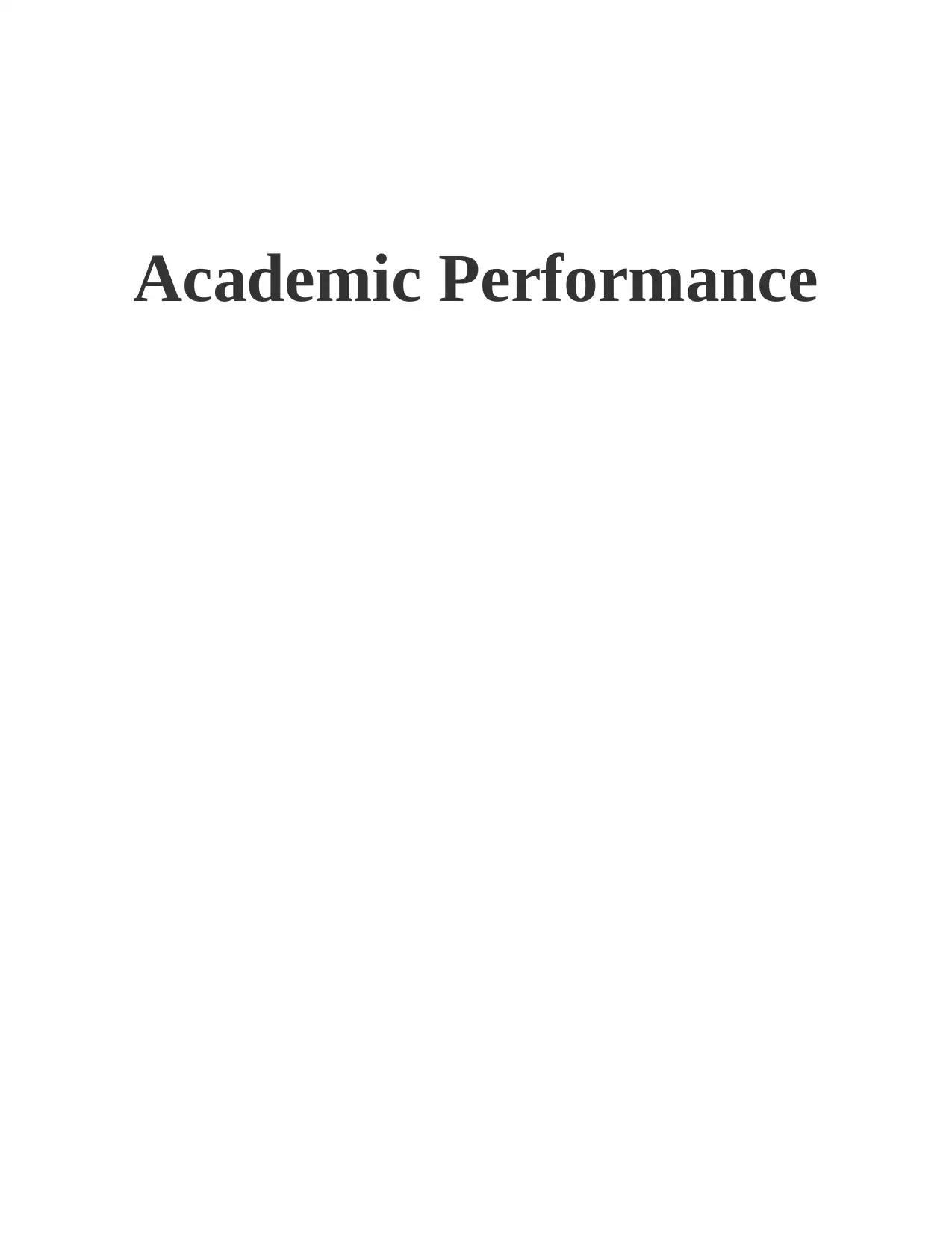
Academic Performance
Paraphrase This Document
Need a fresh take? Get an instant paraphrase of this document with our AI Paraphraser
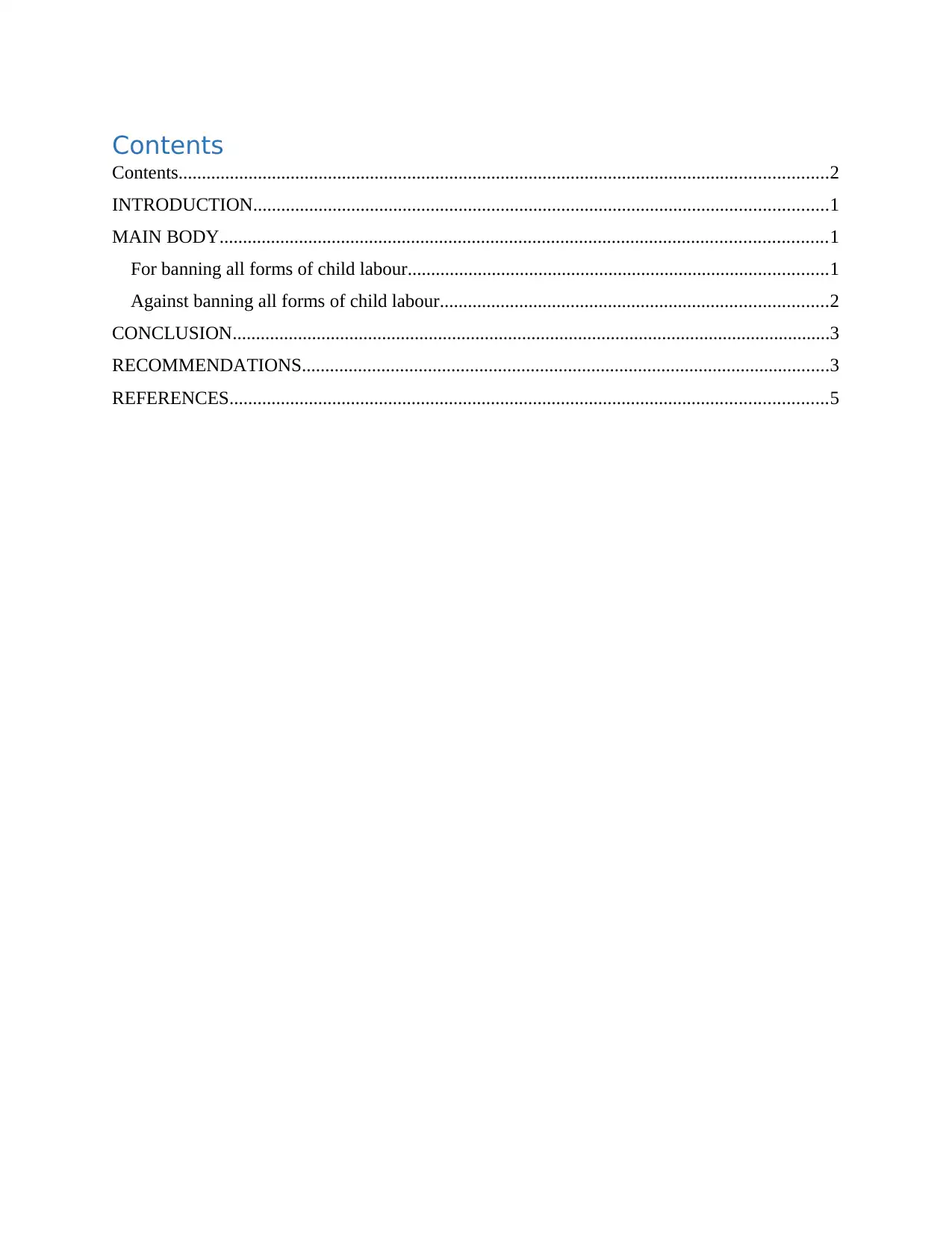
Contents
Contents...........................................................................................................................................2
INTRODUCTION...........................................................................................................................1
MAIN BODY..................................................................................................................................1
For banning all forms of child labour..........................................................................................1
Against banning all forms of child labour...................................................................................2
CONCLUSION................................................................................................................................3
RECOMMENDATIONS.................................................................................................................3
REFERENCES................................................................................................................................5
Contents...........................................................................................................................................2
INTRODUCTION...........................................................................................................................1
MAIN BODY..................................................................................................................................1
For banning all forms of child labour..........................................................................................1
Against banning all forms of child labour...................................................................................2
CONCLUSION................................................................................................................................3
RECOMMENDATIONS.................................................................................................................3
REFERENCES................................................................................................................................5
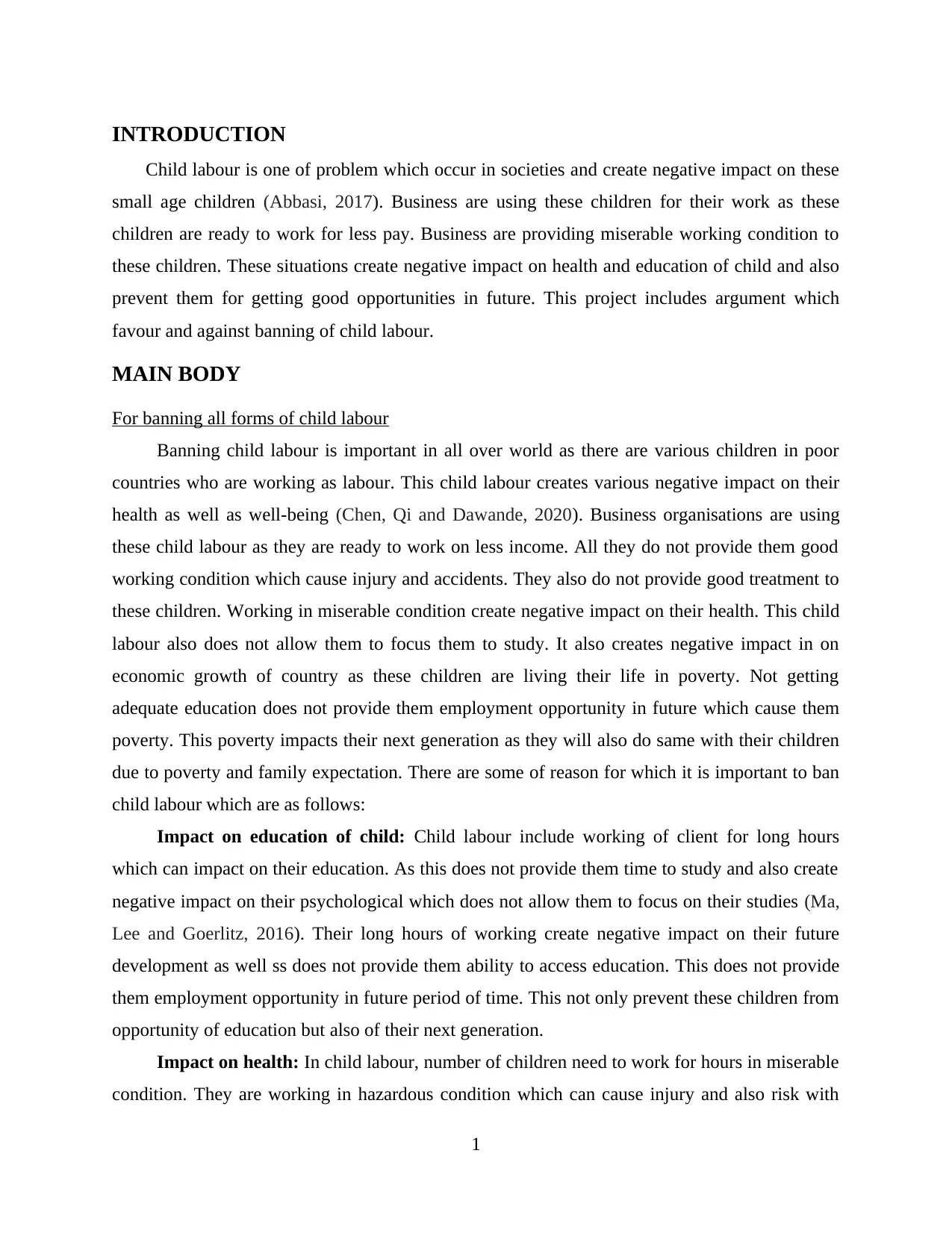
INTRODUCTION
Child labour is one of problem which occur in societies and create negative impact on these
small age children (Abbasi, 2017). Business are using these children for their work as these
children are ready to work for less pay. Business are providing miserable working condition to
these children. These situations create negative impact on health and education of child and also
prevent them for getting good opportunities in future. This project includes argument which
favour and against banning of child labour.
MAIN BODY
For banning all forms of child labour
Banning child labour is important in all over world as there are various children in poor
countries who are working as labour. This child labour creates various negative impact on their
health as well as well-being (Chen, Qi and Dawande, 2020). Business organisations are using
these child labour as they are ready to work on less income. All they do not provide them good
working condition which cause injury and accidents. They also do not provide good treatment to
these children. Working in miserable condition create negative impact on their health. This child
labour also does not allow them to focus them to study. It also creates negative impact in on
economic growth of country as these children are living their life in poverty. Not getting
adequate education does not provide them employment opportunity in future which cause them
poverty. This poverty impacts their next generation as they will also do same with their children
due to poverty and family expectation. There are some of reason for which it is important to ban
child labour which are as follows:
Impact on education of child: Child labour include working of client for long hours
which can impact on their education. As this does not provide them time to study and also create
negative impact on their psychological which does not allow them to focus on their studies (Ma,
Lee and Goerlitz, 2016). Their long hours of working create negative impact on their future
development as well ss does not provide them ability to access education. This does not provide
them employment opportunity in future period of time. This not only prevent these children from
opportunity of education but also of their next generation.
Impact on health: In child labour, number of children need to work for hours in miserable
condition. They are working in hazardous condition which can cause injury and also risk with
1
Child labour is one of problem which occur in societies and create negative impact on these
small age children (Abbasi, 2017). Business are using these children for their work as these
children are ready to work for less pay. Business are providing miserable working condition to
these children. These situations create negative impact on health and education of child and also
prevent them for getting good opportunities in future. This project includes argument which
favour and against banning of child labour.
MAIN BODY
For banning all forms of child labour
Banning child labour is important in all over world as there are various children in poor
countries who are working as labour. This child labour creates various negative impact on their
health as well as well-being (Chen, Qi and Dawande, 2020). Business organisations are using
these child labour as they are ready to work on less income. All they do not provide them good
working condition which cause injury and accidents. They also do not provide good treatment to
these children. Working in miserable condition create negative impact on their health. This child
labour also does not allow them to focus them to study. It also creates negative impact in on
economic growth of country as these children are living their life in poverty. Not getting
adequate education does not provide them employment opportunity in future which cause them
poverty. This poverty impacts their next generation as they will also do same with their children
due to poverty and family expectation. There are some of reason for which it is important to ban
child labour which are as follows:
Impact on education of child: Child labour include working of client for long hours
which can impact on their education. As this does not provide them time to study and also create
negative impact on their psychological which does not allow them to focus on their studies (Ma,
Lee and Goerlitz, 2016). Their long hours of working create negative impact on their future
development as well ss does not provide them ability to access education. This does not provide
them employment opportunity in future period of time. This not only prevent these children from
opportunity of education but also of their next generation.
Impact on health: In child labour, number of children need to work for hours in miserable
condition. They are working in hazardous condition which can cause injury and also risk with
1
⊘ This is a preview!⊘
Do you want full access?
Subscribe today to unlock all pages.

Trusted by 1+ million students worldwide
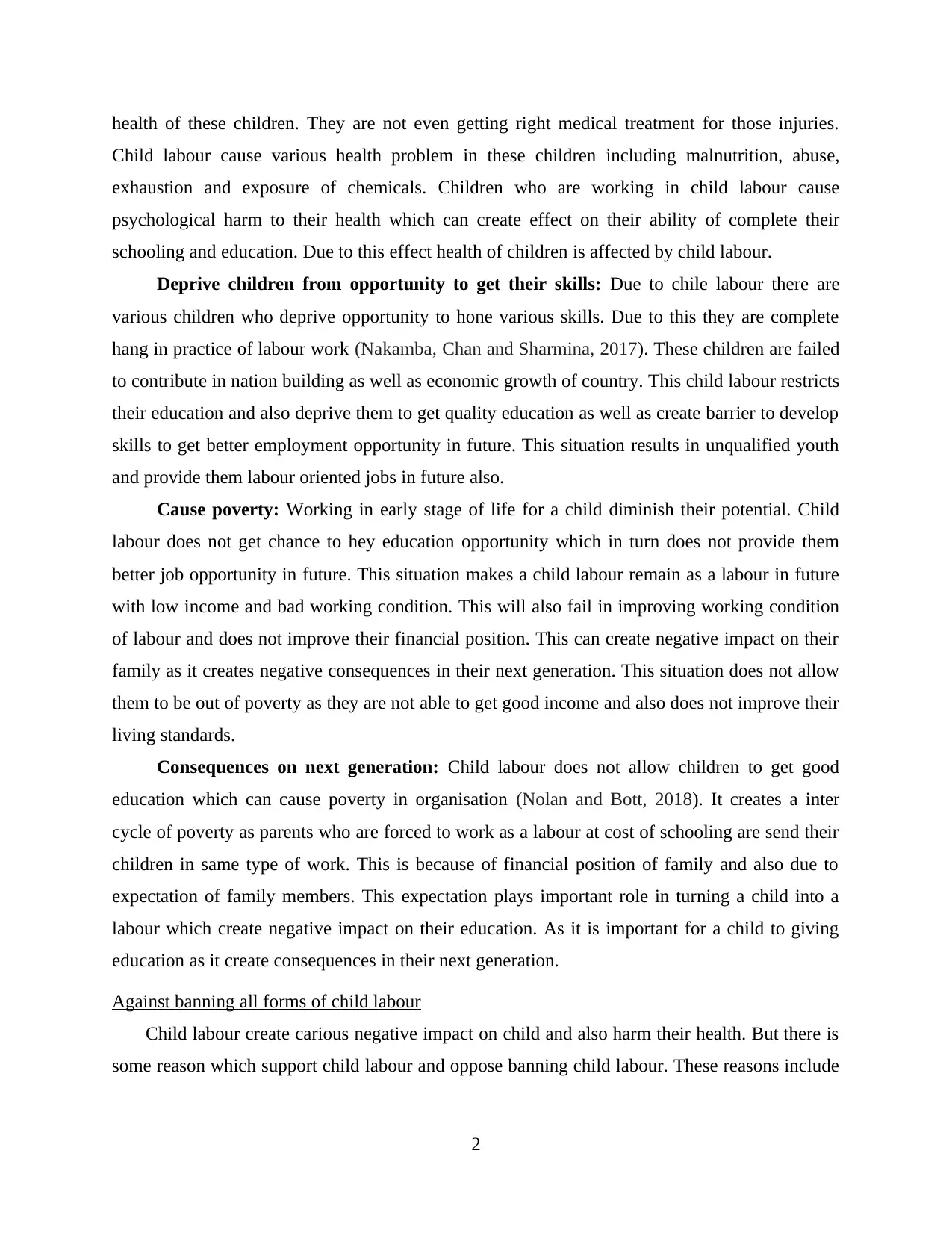
health of these children. They are not even getting right medical treatment for those injuries.
Child labour cause various health problem in these children including malnutrition, abuse,
exhaustion and exposure of chemicals. Children who are working in child labour cause
psychological harm to their health which can create effect on their ability of complete their
schooling and education. Due to this effect health of children is affected by child labour.
Deprive children from opportunity to get their skills: Due to chile labour there are
various children who deprive opportunity to hone various skills. Due to this they are complete
hang in practice of labour work (Nakamba, Chan and Sharmina, 2017). These children are failed
to contribute in nation building as well as economic growth of country. This child labour restricts
their education and also deprive them to get quality education as well as create barrier to develop
skills to get better employment opportunity in future. This situation results in unqualified youth
and provide them labour oriented jobs in future also.
Cause poverty: Working in early stage of life for a child diminish their potential. Child
labour does not get chance to hey education opportunity which in turn does not provide them
better job opportunity in future. This situation makes a child labour remain as a labour in future
with low income and bad working condition. This will also fail in improving working condition
of labour and does not improve their financial position. This can create negative impact on their
family as it creates negative consequences in their next generation. This situation does not allow
them to be out of poverty as they are not able to get good income and also does not improve their
living standards.
Consequences on next generation: Child labour does not allow children to get good
education which can cause poverty in organisation (Nolan and Bott, 2018). It creates a inter
cycle of poverty as parents who are forced to work as a labour at cost of schooling are send their
children in same type of work. This is because of financial position of family and also due to
expectation of family members. This expectation plays important role in turning a child into a
labour which create negative impact on their education. As it is important for a child to giving
education as it create consequences in their next generation.
Against banning all forms of child labour
Child labour create carious negative impact on child and also harm their health. But there is
some reason which support child labour and oppose banning child labour. These reasons include
2
Child labour cause various health problem in these children including malnutrition, abuse,
exhaustion and exposure of chemicals. Children who are working in child labour cause
psychological harm to their health which can create effect on their ability of complete their
schooling and education. Due to this effect health of children is affected by child labour.
Deprive children from opportunity to get their skills: Due to chile labour there are
various children who deprive opportunity to hone various skills. Due to this they are complete
hang in practice of labour work (Nakamba, Chan and Sharmina, 2017). These children are failed
to contribute in nation building as well as economic growth of country. This child labour restricts
their education and also deprive them to get quality education as well as create barrier to develop
skills to get better employment opportunity in future. This situation results in unqualified youth
and provide them labour oriented jobs in future also.
Cause poverty: Working in early stage of life for a child diminish their potential. Child
labour does not get chance to hey education opportunity which in turn does not provide them
better job opportunity in future. This situation makes a child labour remain as a labour in future
with low income and bad working condition. This will also fail in improving working condition
of labour and does not improve their financial position. This can create negative impact on their
family as it creates negative consequences in their next generation. This situation does not allow
them to be out of poverty as they are not able to get good income and also does not improve their
living standards.
Consequences on next generation: Child labour does not allow children to get good
education which can cause poverty in organisation (Nolan and Bott, 2018). It creates a inter
cycle of poverty as parents who are forced to work as a labour at cost of schooling are send their
children in same type of work. This is because of financial position of family and also due to
expectation of family members. This expectation plays important role in turning a child into a
labour which create negative impact on their education. As it is important for a child to giving
education as it create consequences in their next generation.
Against banning all forms of child labour
Child labour create carious negative impact on child and also harm their health. But there is
some reason which support child labour and oppose banning child labour. These reasons include
2
Paraphrase This Document
Need a fresh take? Get an instant paraphrase of this document with our AI Paraphraser
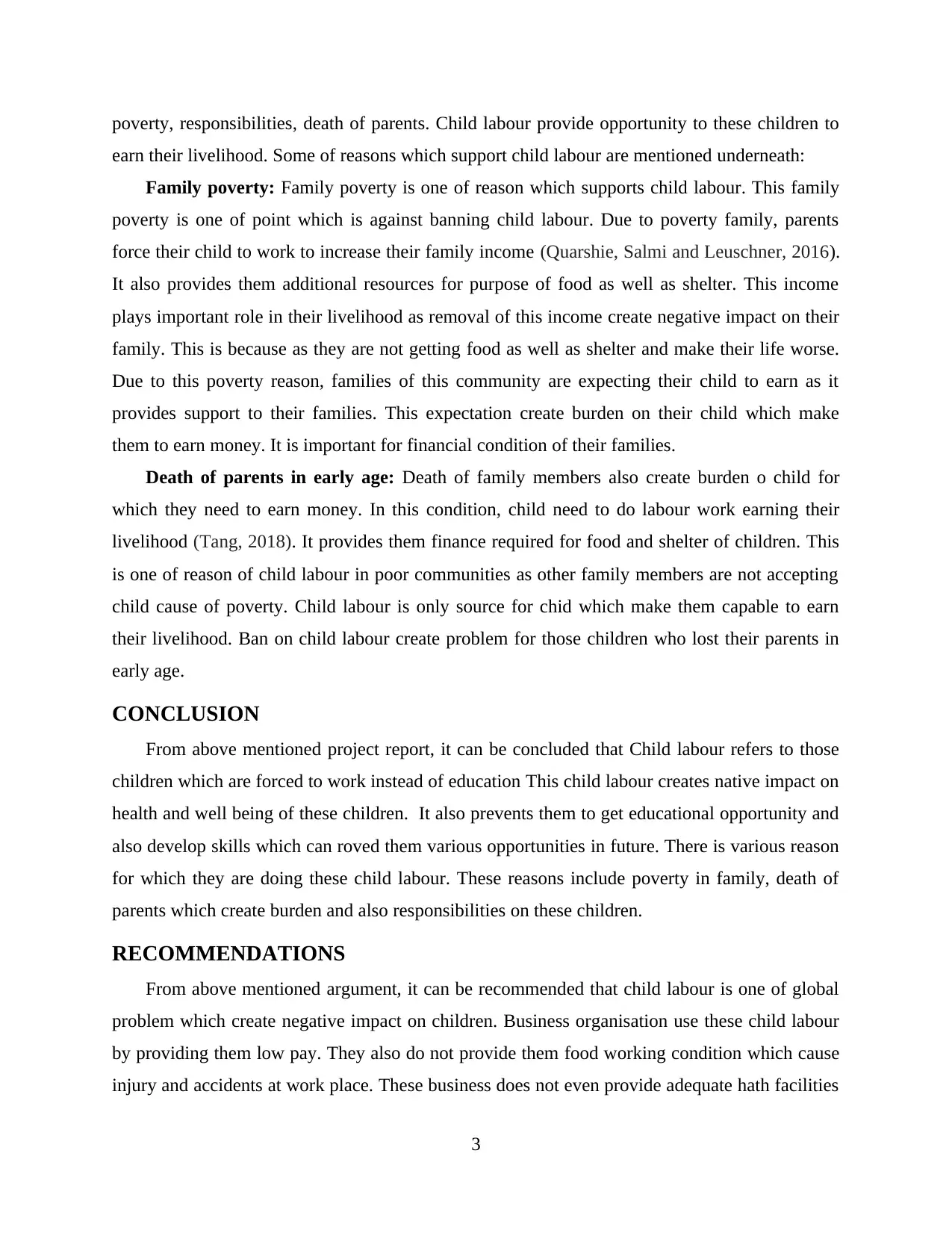
poverty, responsibilities, death of parents. Child labour provide opportunity to these children to
earn their livelihood. Some of reasons which support child labour are mentioned underneath:
Family poverty: Family poverty is one of reason which supports child labour. This family
poverty is one of point which is against banning child labour. Due to poverty family, parents
force their child to work to increase their family income (Quarshie, Salmi and Leuschner, 2016).
It also provides them additional resources for purpose of food as well as shelter. This income
plays important role in their livelihood as removal of this income create negative impact on their
family. This is because as they are not getting food as well as shelter and make their life worse.
Due to this poverty reason, families of this community are expecting their child to earn as it
provides support to their families. This expectation create burden on their child which make
them to earn money. It is important for financial condition of their families.
Death of parents in early age: Death of family members also create burden o child for
which they need to earn money. In this condition, child need to do labour work earning their
livelihood (Tang, 2018). It provides them finance required for food and shelter of children. This
is one of reason of child labour in poor communities as other family members are not accepting
child cause of poverty. Child labour is only source for chid which make them capable to earn
their livelihood. Ban on child labour create problem for those children who lost their parents in
early age.
CONCLUSION
From above mentioned project report, it can be concluded that Child labour refers to those
children which are forced to work instead of education This child labour creates native impact on
health and well being of these children. It also prevents them to get educational opportunity and
also develop skills which can roved them various opportunities in future. There is various reason
for which they are doing these child labour. These reasons include poverty in family, death of
parents which create burden and also responsibilities on these children.
RECOMMENDATIONS
From above mentioned argument, it can be recommended that child labour is one of global
problem which create negative impact on children. Business organisation use these child labour
by providing them low pay. They also do not provide them food working condition which cause
injury and accidents at work place. These business does not even provide adequate hath facilities
3
earn their livelihood. Some of reasons which support child labour are mentioned underneath:
Family poverty: Family poverty is one of reason which supports child labour. This family
poverty is one of point which is against banning child labour. Due to poverty family, parents
force their child to work to increase their family income (Quarshie, Salmi and Leuschner, 2016).
It also provides them additional resources for purpose of food as well as shelter. This income
plays important role in their livelihood as removal of this income create negative impact on their
family. This is because as they are not getting food as well as shelter and make their life worse.
Due to this poverty reason, families of this community are expecting their child to earn as it
provides support to their families. This expectation create burden on their child which make
them to earn money. It is important for financial condition of their families.
Death of parents in early age: Death of family members also create burden o child for
which they need to earn money. In this condition, child need to do labour work earning their
livelihood (Tang, 2018). It provides them finance required for food and shelter of children. This
is one of reason of child labour in poor communities as other family members are not accepting
child cause of poverty. Child labour is only source for chid which make them capable to earn
their livelihood. Ban on child labour create problem for those children who lost their parents in
early age.
CONCLUSION
From above mentioned project report, it can be concluded that Child labour refers to those
children which are forced to work instead of education This child labour creates native impact on
health and well being of these children. It also prevents them to get educational opportunity and
also develop skills which can roved them various opportunities in future. There is various reason
for which they are doing these child labour. These reasons include poverty in family, death of
parents which create burden and also responsibilities on these children.
RECOMMENDATIONS
From above mentioned argument, it can be recommended that child labour is one of global
problem which create negative impact on children. Business organisation use these child labour
by providing them low pay. They also do not provide them food working condition which cause
injury and accidents at work place. These business does not even provide adequate hath facilities
3
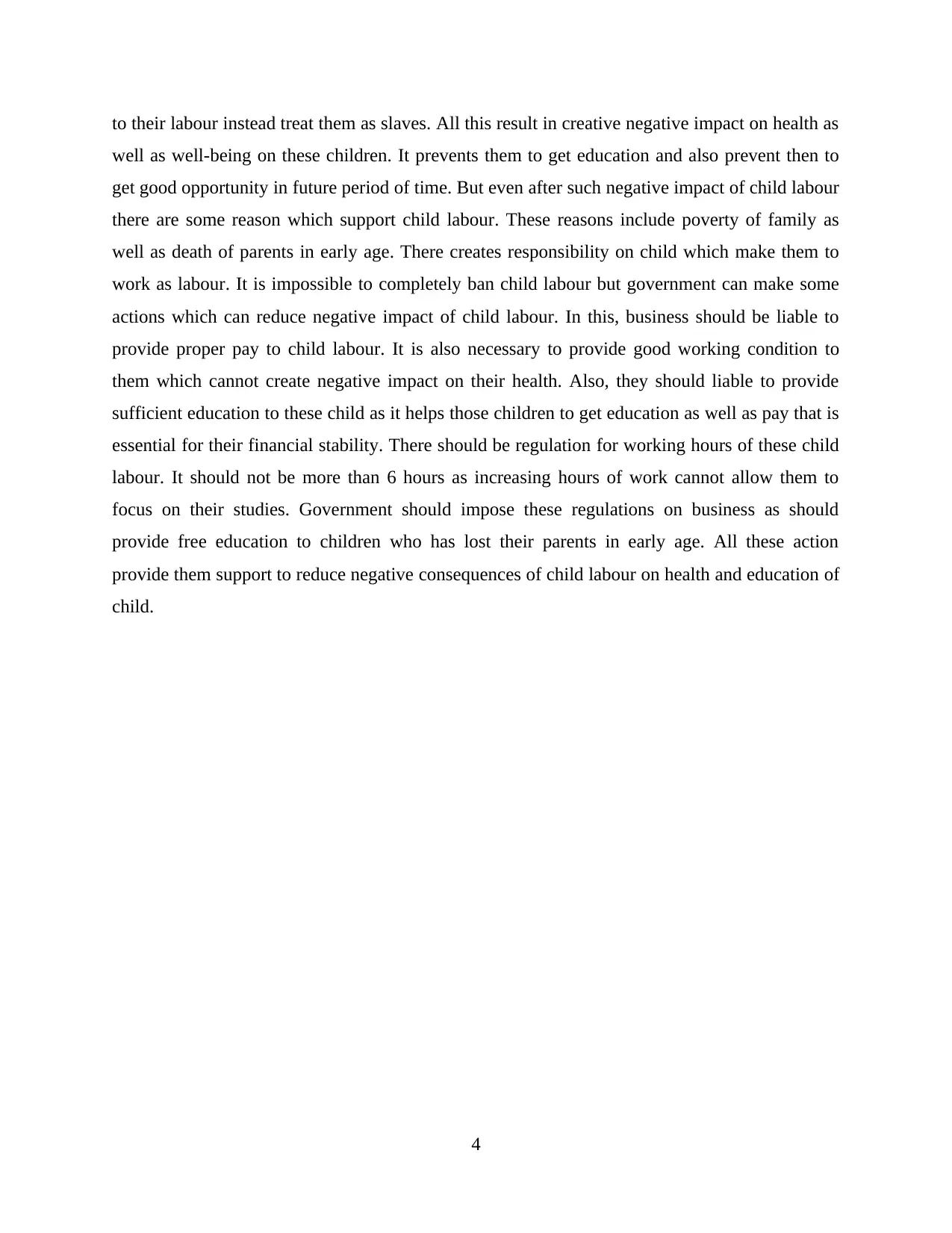
to their labour instead treat them as slaves. All this result in creative negative impact on health as
well as well-being on these children. It prevents them to get education and also prevent then to
get good opportunity in future period of time. But even after such negative impact of child labour
there are some reason which support child labour. These reasons include poverty of family as
well as death of parents in early age. There creates responsibility on child which make them to
work as labour. It is impossible to completely ban child labour but government can make some
actions which can reduce negative impact of child labour. In this, business should be liable to
provide proper pay to child labour. It is also necessary to provide good working condition to
them which cannot create negative impact on their health. Also, they should liable to provide
sufficient education to these child as it helps those children to get education as well as pay that is
essential for their financial stability. There should be regulation for working hours of these child
labour. It should not be more than 6 hours as increasing hours of work cannot allow them to
focus on their studies. Government should impose these regulations on business as should
provide free education to children who has lost their parents in early age. All these action
provide them support to reduce negative consequences of child labour on health and education of
child.
4
well as well-being on these children. It prevents them to get education and also prevent then to
get good opportunity in future period of time. But even after such negative impact of child labour
there are some reason which support child labour. These reasons include poverty of family as
well as death of parents in early age. There creates responsibility on child which make them to
work as labour. It is impossible to completely ban child labour but government can make some
actions which can reduce negative impact of child labour. In this, business should be liable to
provide proper pay to child labour. It is also necessary to provide good working condition to
them which cannot create negative impact on their health. Also, they should liable to provide
sufficient education to these child as it helps those children to get education as well as pay that is
essential for their financial stability. There should be regulation for working hours of these child
labour. It should not be more than 6 hours as increasing hours of work cannot allow them to
focus on their studies. Government should impose these regulations on business as should
provide free education to children who has lost their parents in early age. All these action
provide them support to reduce negative consequences of child labour on health and education of
child.
4
⊘ This is a preview!⊘
Do you want full access?
Subscribe today to unlock all pages.

Trusted by 1+ million students worldwide
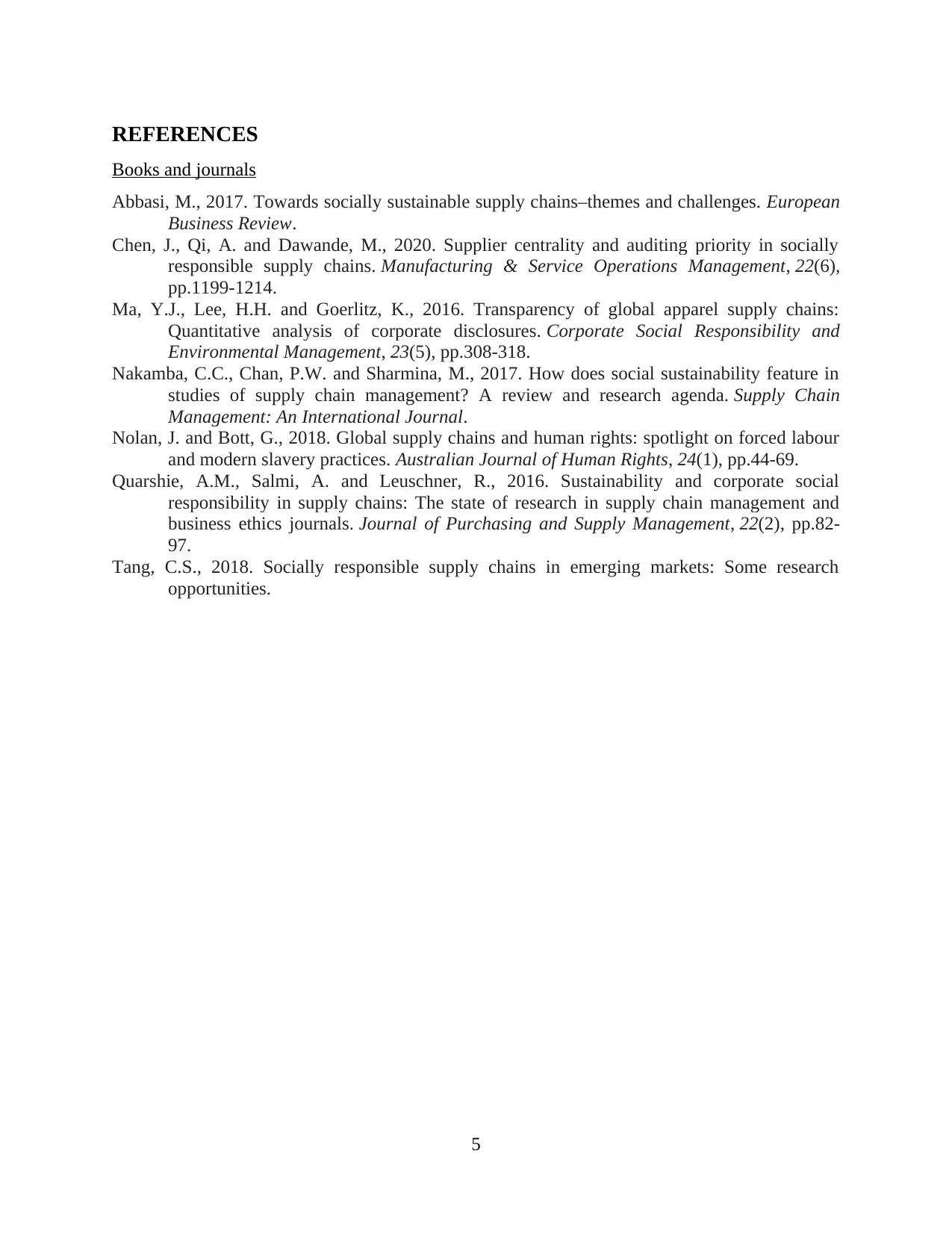
REFERENCES
Books and journals
Abbasi, M., 2017. Towards socially sustainable supply chains–themes and challenges. European
Business Review.
Chen, J., Qi, A. and Dawande, M., 2020. Supplier centrality and auditing priority in socially
responsible supply chains. Manufacturing & Service Operations Management, 22(6),
pp.1199-1214.
Ma, Y.J., Lee, H.H. and Goerlitz, K., 2016. Transparency of global apparel supply chains:
Quantitative analysis of corporate disclosures. Corporate Social Responsibility and
Environmental Management, 23(5), pp.308-318.
Nakamba, C.C., Chan, P.W. and Sharmina, M., 2017. How does social sustainability feature in
studies of supply chain management? A review and research agenda. Supply Chain
Management: An International Journal.
Nolan, J. and Bott, G., 2018. Global supply chains and human rights: spotlight on forced labour
and modern slavery practices. Australian Journal of Human Rights, 24(1), pp.44-69.
Quarshie, A.M., Salmi, A. and Leuschner, R., 2016. Sustainability and corporate social
responsibility in supply chains: The state of research in supply chain management and
business ethics journals. Journal of Purchasing and Supply Management, 22(2), pp.82-
97.
Tang, C.S., 2018. Socially responsible supply chains in emerging markets: Some research
opportunities.
5
Books and journals
Abbasi, M., 2017. Towards socially sustainable supply chains–themes and challenges. European
Business Review.
Chen, J., Qi, A. and Dawande, M., 2020. Supplier centrality and auditing priority in socially
responsible supply chains. Manufacturing & Service Operations Management, 22(6),
pp.1199-1214.
Ma, Y.J., Lee, H.H. and Goerlitz, K., 2016. Transparency of global apparel supply chains:
Quantitative analysis of corporate disclosures. Corporate Social Responsibility and
Environmental Management, 23(5), pp.308-318.
Nakamba, C.C., Chan, P.W. and Sharmina, M., 2017. How does social sustainability feature in
studies of supply chain management? A review and research agenda. Supply Chain
Management: An International Journal.
Nolan, J. and Bott, G., 2018. Global supply chains and human rights: spotlight on forced labour
and modern slavery practices. Australian Journal of Human Rights, 24(1), pp.44-69.
Quarshie, A.M., Salmi, A. and Leuschner, R., 2016. Sustainability and corporate social
responsibility in supply chains: The state of research in supply chain management and
business ethics journals. Journal of Purchasing and Supply Management, 22(2), pp.82-
97.
Tang, C.S., 2018. Socially responsible supply chains in emerging markets: Some research
opportunities.
5
1 out of 7
Related Documents
Your All-in-One AI-Powered Toolkit for Academic Success.
+13062052269
info@desklib.com
Available 24*7 on WhatsApp / Email
![[object Object]](/_next/static/media/star-bottom.7253800d.svg)
Unlock your academic potential
Copyright © 2020–2026 A2Z Services. All Rights Reserved. Developed and managed by ZUCOL.





